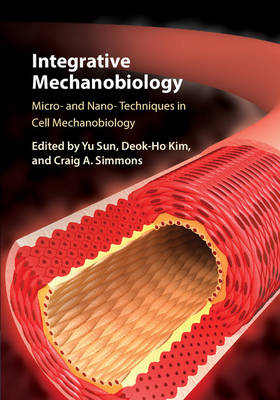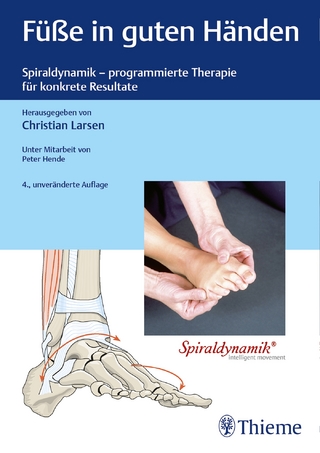
Integrative Mechanobiology
Cambridge University Press (Verlag)
978-1-107-07839-0 (ISBN)
- Keine Verlagsinformationen verfügbar
- Artikel merken
The first of its kind, this comprehensive resource integrates cellular mechanobiology with micro-nano techniques to provide unrivalled in-depth coverage of the field, including state-of-the-art methods, recent advances, and biological discoveries. Structured in two parts, the first part offers detailed analysis of innovative micro-nano techniques including FRET imaging, electron cryo-microscopy, micropost arrays, nanotopography devices, laser ablation, and computational image analysis. The second part of the book provides valuable insights into the most recent technological advances and discoveries in areas such as stem cell, heart, bone, brain, tumor, and fibroblast mechanobiology. Written by a team of leading experts and well-recognised researchers, this is an essential resource for students and researchers in biomedical engineering.
Yu Sun is a Professor at the University of Toronto with cross-appointments in the Department of Mechanical and Industrial Engineering, the Institute of Biomaterials and Biomedical Engineering, and the Department of Electrical and Computer Engineering. He is the Canada Research Chair in Micro- and Nano-Engineering Systems. He was inducted Fellow of ASME, IEEE, and CAE for his work on micro-nano devices and robotic systems. His awards include the 2010 IEEE Robotics and Automation Society Early Career Award and an NSERC E. W. R. Steacie Memorial Fellowship in 2013. Deok-Ho Kim is a Professor in the Department of Bioengineering at the University of Washington. His active research in the areas of micro/nanotechnologies, systems mechanobiology and tissue engineering has been recognized with many awards including the Samsung Humantech Thesis Award (2009), the Harold M. Weintraub Award in Biological Sciences (2010), the American Heart Association National Scientist Development Award (2012), the KSEA Young Investigator Award (2013), and the BMES-CMBE Rising Star Award (2013). Craig A. Simmons is a Professor at the University of Toronto with cross-appointments in the Department of Mechanical and Industrial Engineering and the Institute of Biomaterials and Biomedical Engineering. His research in cell mechanobiology, tissue engineering, and microtechnologies has been recognized with the Canada Research Chair in Mechanobiology, the McCharles Prize (2010), and the McLean Award (2012).
Part I. Micro/Nano Techniques in Cell Mechanobiology: 1. Nanotechnologies and FRET imaging in live cells Eddie Y. Chung, Qin Qin, Agamoni Bhattacharyya, Shaoying Lu and Yingxiao Wang; 2. Electron microscopy and three-dimensional single-particle analysis as tools for understanding the structural basis of mechanobiology Niels Volkmann and Dorit Hanein; 3. Stretchable micropost array cytometry: a powerful tool for cell mechanics and mechanobiology research Yue Shao, Shinuo Weng and Jianping Fu; 4. Microscale generation of dynamic forces in cell culture systems Christopher Moraes, Luke A. MacQueen, Yu Sun and Craig A. Simmons; 5. Multi-scale topographical approaches for cell mechanobiology studies Koichiro Uto, Elliot Fisher, Hong-Nam Kim, Chang Ho Seo and Deok-Ho Kim; 6. Hydrogels with dynamically tunable properties Murat Guvendiren and Jason A. Burdick; 7. Micro-engineered tools for studying cell migration in electric fields Jiandong Wu and Francis Lin; 8. Laser ablation to investigate cell and tissue mechanics in vivo Teresa Zulueta-Coarasa and Rodrigo Fernandez-Gonzalez; 9. Computational image analysis techniques for cell mechanobiology Ge Yang and Hao-Chih Lee; 10. Micro- and nanotools to probe cancer cell mechanics and mechanobiology Yasaman Nematbakhsh and Chwee Teck Lim; 11. Stimuli-responsive polymeric substrates for cell-matrix mechanobiology Mitsuhiro Ebara and Koichiro Uto; Part II. Recent Progress in Cell Mechanobiology: 12. Forces of nature: understanding the role of mechanotransduction in stem cell differentiation Andrew W. Holle, Jennifer L. Young and Yu Suk Choi; 13. Heart valve mechanobiology Craig Simmons; 14. Bone cell mechanobiology using micro- and nano-techniques Chao Liu, Kevin Middleton and Lidan You; 15. Molecular mechanisms of cellular mechanotransduction in wound healing Vincent F. Fiore, Dwight M. Chambers and Thomas H. Barker; 16. Micropost arrays as a means to assess cardiac muscle cells Andrea Leonard, Marita L. Rodriguez and Nathan J. Sniadecki; 17. Micro/nanofabrication for the study of biochemical and biomechanical regulation of T cell activation Hye Mi Kim and Junsang Doh; 18. Study of tumor angiogenesis using microfluidic approaches Yoojin Shin, Sewoon Han, Hyo-Eun Jeong, Jeong Ah Kim, Jessie S. Jeon and Sid Chung; 19. Neuromechanobiology of the brain: mechanics of neuronal structure, function, and pathophysiology Jerel Mueller and William Tyler.
| Erscheint lt. Verlag | 12.11.2015 |
|---|---|
| Zusatzinfo | 55 Halftones, unspecified; 34 Line drawings, unspecified |
| Verlagsort | Cambridge |
| Sprache | englisch |
| Maße | 177 x 252 mm |
| Gewicht | 900 g |
| Themenwelt | Medizin / Pharmazie ► Physiotherapie / Ergotherapie ► Orthopädie |
| Naturwissenschaften ► Biologie ► Zellbiologie | |
| Naturwissenschaften ► Physik / Astronomie ► Angewandte Physik | |
| Naturwissenschaften ► Physik / Astronomie ► Strömungsmechanik | |
| Technik ► Maschinenbau | |
| Technik ► Medizintechnik | |
| ISBN-10 | 1-107-07839-3 / 1107078393 |
| ISBN-13 | 978-1-107-07839-0 / 9781107078390 |
| Zustand | Neuware |
| Haben Sie eine Frage zum Produkt? |
aus dem Bereich


